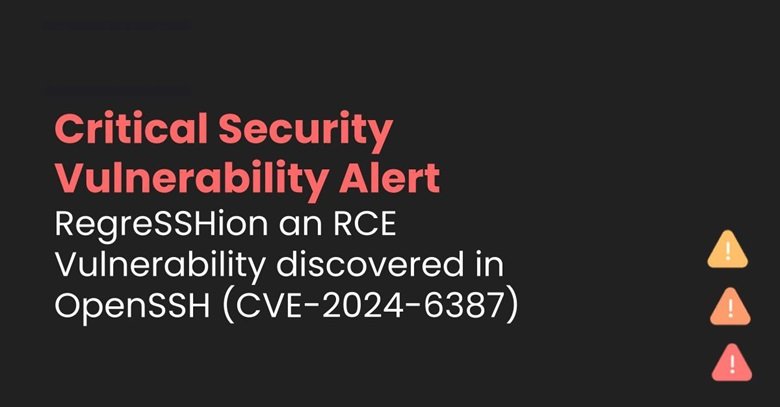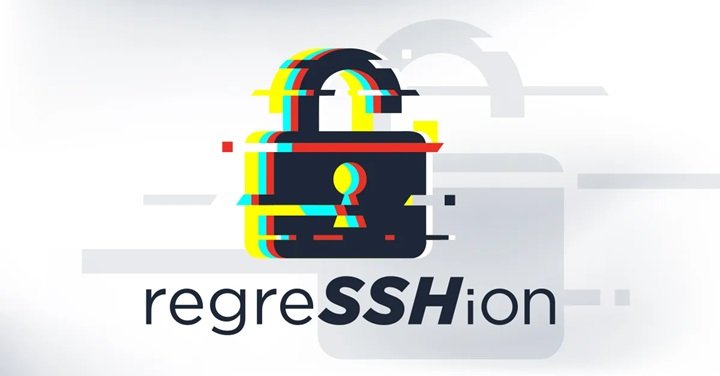Table of Contents
Introduction – regreSSHion
In the world of cybersecurity, vigilance is a perpetual necessity. Recently, a significant vulnerability, dubbed “regreSSHion,” has been discovered in OpenSSH, affecting numerous Linux systems. This flaw has stirred considerable concern among IT professionals and organizations relying on Linux for secure communications. Let’s dive into what this vulnerability entails, how it impacts real-world scenarios, and what steps can be taken to mitigate the risks.
CVE-2024-6387, boasting an impressive CVSS score of 8.1, represents a security regression stemming from CVE-2006-5051. This vulnerability mirrors a signal handler race condition in pre-version 4.4 of OpenSSH. Dubbed “regreSSHion,” it was initially believed resolved but resurfaced in October 2020 (OpenSSH 8.5p1) due to the inadvertent removal of a critical safety check in the sigdie() function.
What is OpenSSH?
OpenSSH, or Open Secure Shell, is a suite of secure networking utilities based on the Secure Shell (SSH) protocol. It provides encrypted communication sessions over an unsecured network, ensuring data confidentiality and integrity. OpenSSH is widely used for remote server administration, secure file transfers, and various other network services, making it a cornerstone of modern cybersecurity practices.
The regreSSHion Vulnerability
The regreSSHion flaw is a critical security vulnerability discovered in OpenSSH that affects many Linux systems. This vulnerability can potentially allow malicious actors to execute unauthorized actions, compromise sensitive data, or even take control of affected systems. The flaw lies in the implementation of certain security features within OpenSSH, which, under specific conditions, fail to function as intended.

Real-Life Impact
To understand the gravity of regreSSHion, let’s consider a real-life scenario. Imagine a company, TechSecure Inc., that relies on OpenSSH for remote server management. Their IT team uses OpenSSH to connect to various servers across the globe securely. With the regreSSHion vulnerability, a hacker could exploit this flaw to gain unauthorized access to these servers. This access could lead to data breaches, loss of sensitive customer information, and potentially severe financial and reputational damage to the company.
How Was regreSSHion Discovered?
The discovery of regreSSHion highlights the importance of continuous security audits and research. Security researchers, often working in collaboration with cybersecurity firms, identified the flaw through rigorous testing and analysis. This discovery underscores the collaborative nature of cybersecurity, where sharing information and findings helps in building a safer digital environment.
Steps to Mitigate regreSSHion
- Update OpenSSH: The first and foremost step is to ensure that your OpenSSH installation is up to date. Developers frequently release patches and updates to address known vulnerabilities. Applying these updates promptly can significantly reduce the risk of exploitation.
- Implement Strong Access Controls: Restrict access to your servers using robust authentication methods such as key-based authentication rather than passwords. Ensure that only authorized personnel have access to critical systems.
- Monitor Network Traffic: Regularly monitor network traffic for any unusual or suspicious activities. Intrusion detection systems (IDS) and intrusion prevention systems (IPS) can help in identifying potential threats early.
- Conduct Regular Audits: Regular security audits of your systems and networks can help in identifying vulnerabilities before they are exploited. Engage with cybersecurity experts to perform these audits periodically.
- Educate Your Team: Ensure that your IT staff and users are aware of the latest cybersecurity threats and best practices. Continuous education and training can build a more security-conscious organization.
Conclusion – regreSSHion
The regreSSHion vulnerability in OpenSSH serves as a stark reminder of the ever-present threats in the cybersecurity landscape. By staying informed, applying timely updates, and following best practices, organizations can protect themselves from such critical vulnerabilities. As always, the key to robust cybersecurity lies in a proactive and informed approach. Stay safe and secure!




Leave a Reply